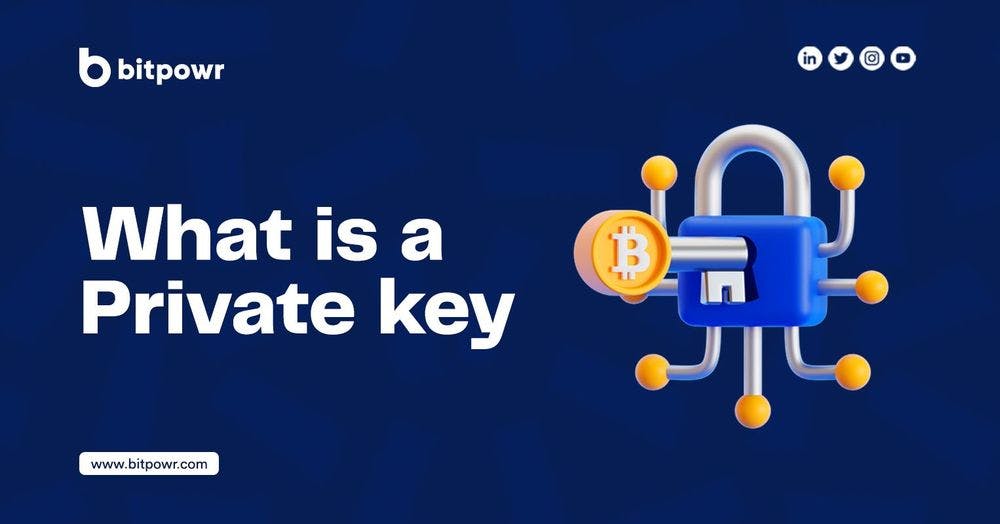A private key is a secret number or phrase that allows users to access their digital assets. It is used to sign transactions, which allows users to send and receive cryptocurrency. Private keys are stored in wallets, which can be hot wallets or cold wallets. Hot wallets are connected to the internet, while cold wallets are not.
Here is an example of a [Bitcoin](https://academy.binance.com/en/articles/what-is-bitcoin) key: L2hjTJNhjpUTdAVMArh3UqmnTXEVx6J6Faui8cUXCPpyQMUEkJ55
When a user creates a wallet, they are given a private key and a public key. The public key is used to receive cryptocurrency, while the private key is used to sign transactions. The private key is kept secret, while the public key is shared with others.
When a user wants to send cryptocurrency, they use their private key to sign the transaction. This transaction is then broadcasted to the network, and other nodes on the network verify the signature. If the signature is valid, the transaction is added to the blockchain.
The blockchain is a public ledger that records all cryptocurrency transactions. It is a distributed ledger, meaning that it is not stored on any single computer. Instead, it is stored on thousands of computers around the world.
When a transaction is added to the blockchain, it becomes permanent and cannot be reversed. This makes cryptocurrency a very secure way to store and transfer value.
Here are some of the key properties of private keys:
- They are long and random strings of numbers and letters.
- They are used to sign transactions.
- They are kept secret.
- They are used to access cryptocurrency wallets.
- They are essential for the security of cryptocurrency.
If you lose your private key, you will lose access to your cryptocurrency. It is important to keep your private key safe and secure. You can do this by storing it in a cold wallet or by writing it down on a piece of paper and storing it in a safe place.
The synergy between Private keys and Digital Wallets
Private keys and wallets play a crucial role in managing cryptocurrencies. However, users are not required to manually create or memorize their key pairs. Instead, digital wallets automate the generation and storage of key pairs. When initiating a transaction, the wallet software utilizes the private key to produce a digital signature by processing the transaction.
The private key serves as authorization for the transaction, ensuring that it remains unaltered once broadcasted. Even slight modifications to the transaction information would result in an incorrect signature since the algorithm generates the same key from identical data.
Losing the private key implies losing access to the wallet, which consequently prevents spending, withdrawing, or transferring assets. Hence, it is vital to securely store the private key.
Two main types of key storage exist, each with two corresponding types of wallets. Custodial wallets involve a trusted third party, like an exchange, storing your keys on your behalf. Noncustodial wallets, on the other hand, enable you to store your own keys. Both categories offer cold wallets (offline, no internet connection) and hot wallets (online, internet-connected).
How to keep your Private Key Safe?
Like any password, it’s crucial to keep your private keys safe. Here are some ways to do that.
- Use a reputable wallet provider: Only use well-known and reputable wallet providers to ensure your private key is kept safe.
- Use a hardware wallet: These devices store your private key offline, making it much more difficult for hackers to access.
- Use a strong password: A strong password will make it difficult for anyone to guess your private key.
- Keep your private key offline: Storing your private key offline, such as on a USB drive or piece of paper, reduces the risk of it being hacked.
- Use a multi-sig wallet: A multi-sig wallet requires multiple signatures to authorize a transaction, adding an extra layer of security. Bitpowr allows you to store your wallet using multi-sig in the form of approvals.
- Keep your software up to date: Ensure your wallet software is up to date with the latest security updates.
- Encrypting your private key with a password: Encrypting your private key with a password adds an extra layer of security to your private key, making it much more difficult for hackers to access.
Conclusion
The private key provides you with the ability to access your wallets and funds. It’s really important to keep this key safe, no matter what kind of wallet you use. If you don’t keep it secure, you could lose all your money. Unlike other keys that you can get help with if you lose them, the private key is your responsibility to look after.
Bitpowr technologies help your businesses build on the blockchain, manage your digital assets, and accept crypto payments. Check out our documentation to learn more about our wallet services and other related products. Contact sales or send an email to [email protected] to get started!




